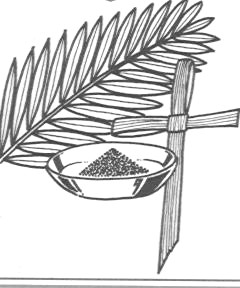The Feeling of a Season
March is usually characterized for us by vacations, freakish weather, and basketball tournaments. Will it also be characterized for us by lent? Lent is a season when, guided by Jesus’ example of forty days in the wilderness, we adopt a spiritual discipline (such as fasting, as Jesus did) and struggle with the temptations which confront us. It is a season in life when some of us give up some element of our lives as a sacrificial discipline. Many of us examine ourselves and ask, as we did this past Ash Wednesday, “What do I want to burn away from my life? Some think of bad habits or luxuries we’ve grown too accustomed to, and decide to practice going without.
I’ve found that my Lenten disciplines are more effective and have the potential for long lasting change in my own behavior if I also think of some positive action or thought and replace the negative with the positive. When my mind turns to the old thought or practice I am asking God to help me abandon for at least a season of discipline, I’ve found it empowering to simply pray, “With your help God, I can….” Followed by the name of that thought or practice you are attempting to abstain from during Lent.
Also important is replacing the “time spent” typically on that previous thought or action, and fill it with time spent in devotion or practicing our discipleship. You have access to many ideas for spiritual disciplines on our linked websites on the church weblog www.morrisokumc.blogspot.com. If you’ve never been to the church website, give it a look
Rabbi Abraham Joshua Heschel spoke of the Sabbath as a “cathedral in time.” I think this is a great way for us to imagine what we are doing with lent. We are tearing down the inner strip malls and brothels and building gardens and sanctuaries. Two of the groups within the church that have real potential for formative spiritual practice that creates a “cathedral in time” are the Covenant Discipleship group and the confirmation class.
Covenant Discipleship is a group of people who hold one another in “covenant accountability.” Each new group creates a new covenant around the four areas of worship, personal devotion, justice and compassion. A pilot group met every week from late 2007 until the end of 2008 to speak with one another about the covenant and how we had lived up to it or not. The process of sharing your struggles and victories with living your discipleship helps to strengthen it. If you are interested in participating in such a group, talk to Kim Davis, Donna Haggard, Shirley Miller, Nathan Mattox, Linda King, Karen Morris or Jackie Vaughn. We are looking expanding the gift of this ministry within the church.
Also embarking on a new course is at least five young people who will be exploring the life of faith and the story of our scriptures and tradition. They will be staying after church several Sundays to participate in discussions, mission trips, tours of other faiths’ houses of worship and even an outing to explore the caves at Devil’s Den State Park in Arkansas. During the first weekend of March, several of them will be attending a Confirmation retreat with youth from around the conference. I’m in charge of the final worship service, which is a real life experience of the Prodigal Son story (excluding the dissolute living, of course.) Be praying for Charlsey, Lee, Travis, Colby, and Rhoen, and if you know of any other 6th-8th graders who would like to participate in confirmation over the next 3 months, a list of our activities is (guess where!) The website!
Also at the church website, you’ll find a link to the “examen,” a prayer tradition from Ignatius, a man who rose to prominence as a fierce soldier, and turned away from that life to instead practice prayer and worship. His daily prayer of sharing with God (and a community) our greatest struggle and joy of the day guides many to a rich spiritual life. A good book about the examen that is very accessible (it even has cartoons) is Sleeping with Bread, by Dennis Linn and his family. I suggest it to you if you’re looking for a spiritual discipline.
I hope Lent is a cathedral in time for you. If you need any guidance in deepening your walk of faith, that is why I am here.


















